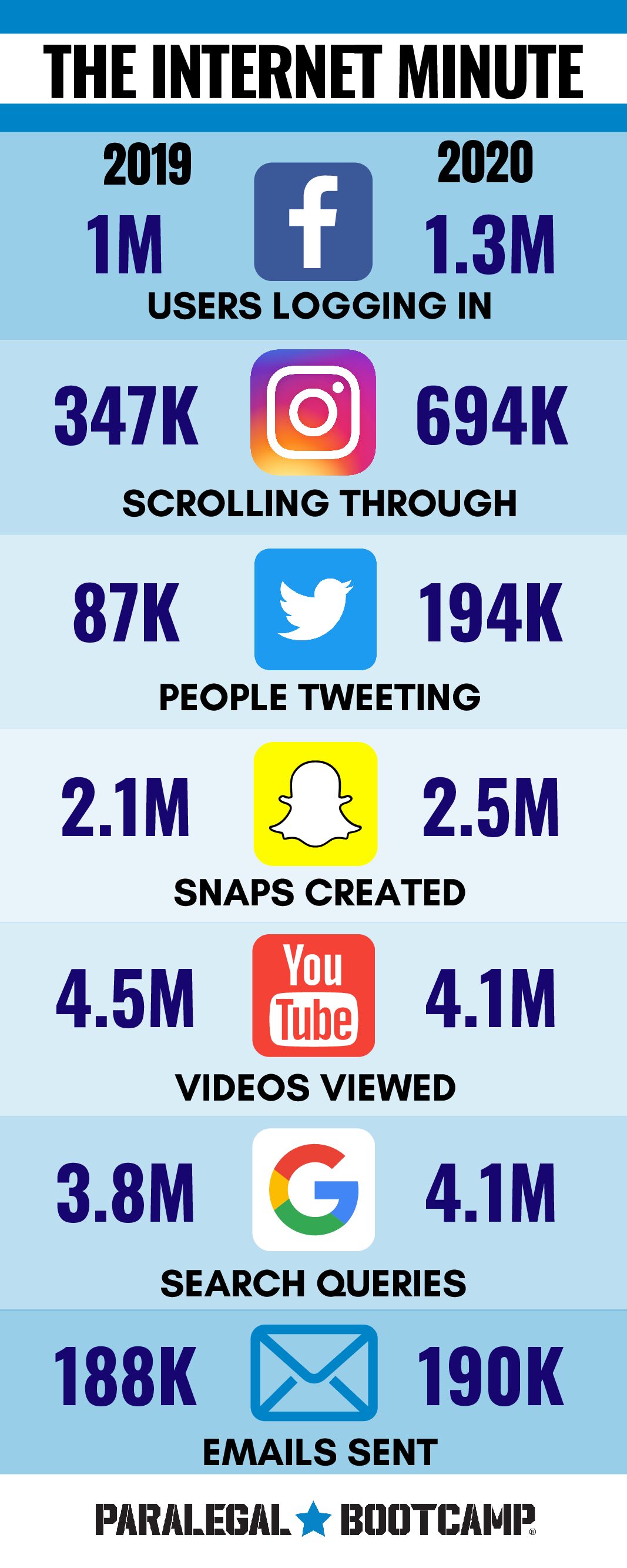Owning a laptop computer and Instagram account might help combat boredom—but doesn’t necessarily translate to technical proficiency in a legal setting. Digital native doesn’t always mean being tech-savvy. In fact, the assumption itself is somewhat false.
Sure, younger generations are practically born with a mobile device in their hand. They are constantly “caught up” in the goings-on of their entire high school class; they can rattle off no fewer than five relevant hashtags for any given topic; they can sync a silly dance video in perfect harmony with a trending soundtrack. However, this inherent familiarity with (and normalization of) technology still leaves a gap of real-world proficiency within the software tools law firms rely on every day.
All that happens during an internet minute may grow from year to year, but we have to remember emoji selection is not a critical skill in the paralegal résumé.

How Paralegals Work
If you’re reading this paralegal blog, there’s a good chance you already have a healthy grasp of what a paralegal does. Regardless, let’s examine the role’s day-to-day responsibilities within the lens of technological proficiency.
Correspondence
A paralegal often acts as the point of contact for clients, witnesses, opposing counsel, law enforcement, and anyone involved in a particular case or transaction. Not only are professional communication skills critical to a paralegal’s job responsibilities, but also the ability to manage and organize these interactions via email and other electronic communication applications.
Case Planning, Development and Management
There are a lot of moving parts to legal cases, regardless of scope. The prep work, planning, collection, and ongoing management of these items commonly land on the paralegal’s desk. Therefore, an individual in this position must be agile, responsive, and able to bounce between documents and applications seamlessly.
Legal Research and Presentations
One of the essential roles of a paralegal is to assist their attorney in serving the client (preparing for trials, hearings, and closings). A large part of this consists of conducting legal research, gathering relevant information, and assembling it all into a written report and/or a presentation. This vital responsibility requires specialized aptitude in both Microsoft Word and PowerPoint.
Draft Pleadings, Document Responses, and Discovery
Generally speaking, a considerable portion of paralegal work falls under the category of desktop publishing. For example, as a litigation paralegal, daily tasks can include drafting legal documents such as complaints, subpoenas, deposition notices, pretrial orders, interrogatories, and briefs with various involved parties. Therefore, paralegal training in the art of written communication, organization, and technology is essential.
Litigation Paralegal Boot Camp
Are you tired of being the Panic Mode Paralegal who spends your days playing whack-a-mole with last-minute rush projects because you’re waiting for someone to show you what it takes to be great litigation paralegal?
This is the only program of its kind that provides litigation paralegals with all of the tools to master litigation cases from the complaint through the trial, and everything in between.
You will be the Confident Case Strategist faster than you ever imagined possible.

Law Office Administrations
At the core of a paralegal’s job description is supporting their attorneys and firm in any reasonable capacity. Of course, this occasionally means answering phones, filing papers, and managing deadlines. You can make yourself indispensable and irreplaceable by mastering the tools required to make a law practice hum. Comprehensive assessment and targeted training can get you there! Even if you don’t have access to formal law firm staff training, it is now easier than ever for you to obtain training for paralegals through online courses.
Learn about Paralegal Roles in Other Countries.

Efficiency is Everything
The average attorney bills clients for 40 hours per week—while actually working 70+ hours. That lost time is often a product of inefficiencies within the firm (and its processes). By definition, a system is a procedure or method that enables you to achieve positive results on repeat with long-term success. Internal efficiency is key to a legal practice’s bottom line, and human capital presents the greatest opportunity to achieve it.
Put yourself in the shoes of a partner in charge of hiring paralegals. Sure, experience and culture fit are important considerations—but what about the candidate’s ability to be productive, efficient, and self-sufficient? For example, a recent grad with a proven (certified) skillset in producing and editing the highly specific document types law practices rely on would absolutely be more attractive than a seasoned paralegal with low confidence in technology.
Law firms see everything in hours and minutes (particularly if they have a billable hour requirement). Become someone who can operate with total fluidity, and you can easily forge your own path in the paralegal world.
Upskilling the Modern Workforce
The problem is clear; law students and young legal professionals lack technical fluency in essential technologies like Microsoft Word, Excel, PowerPoint, Outlook, and PDF. Luckily, we have a solution! Paralegal Bootcamp has recently partnered with Procertas®—one of the most trusted office training programs in the industry.
Their Legal Technology Assessment (LTA) helps individuals identify and address critical skill gaps in the software they’ll utilize in their daily professional lives. In fact, 85+ universities have adopted Procertas into their law program offerings and 50+ firms have integrated it into their employee training programs.
Procertas is an interactive learning platform with a competency-based approach, so you don’t spend time learning skills you already have. It shows paralegals what they don’t know about the basic office technologies they’ll be utilizing in their daily professional lives and allows them to address those key skill gaps with guided instruction on a module-based online platform.
Students actually work with live documents on their own computers, using their own respective versions of these software packages. No downloads; no additional desktop clutter; easily accessible from anywhere at any time.
The primary focus of LTA is to ensure paralegals, at any stage of their career, are making the very most of the tools and applications that define productivity in the modern law firm environment.
Stop undermining your potential by sticking to the basics of sending emails and using a smartphone and start leveling up your career with a skillset that will have firms looking to give you more money and admiration for what you bring to the table. The key to showing how indispensable you truly are is being able to adapt in an ever-changing environment. Technology isn’t going anywhere and with Procertas you can make sure you move forward into the future instead of getting left behind.

Meet the Author
Casey Flaherty is the co-founder of Procertas, as well as the co-founder and chief strategy officer of LexFusion. A former BigLaw litigator, in-house counsel, and legal operations consultant, Casey has spent the last decade focusing the legal market’s attention on the need for better tech tools, and the attendant need for us to become better users of the tech tools already at our disposal.


























